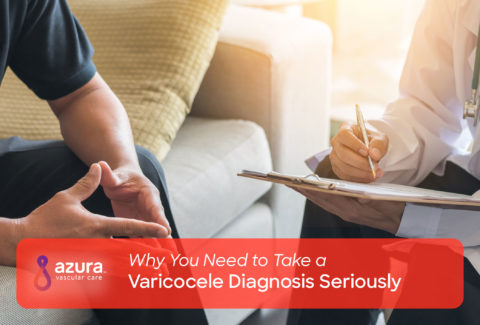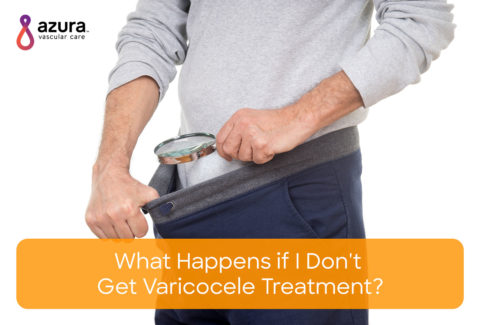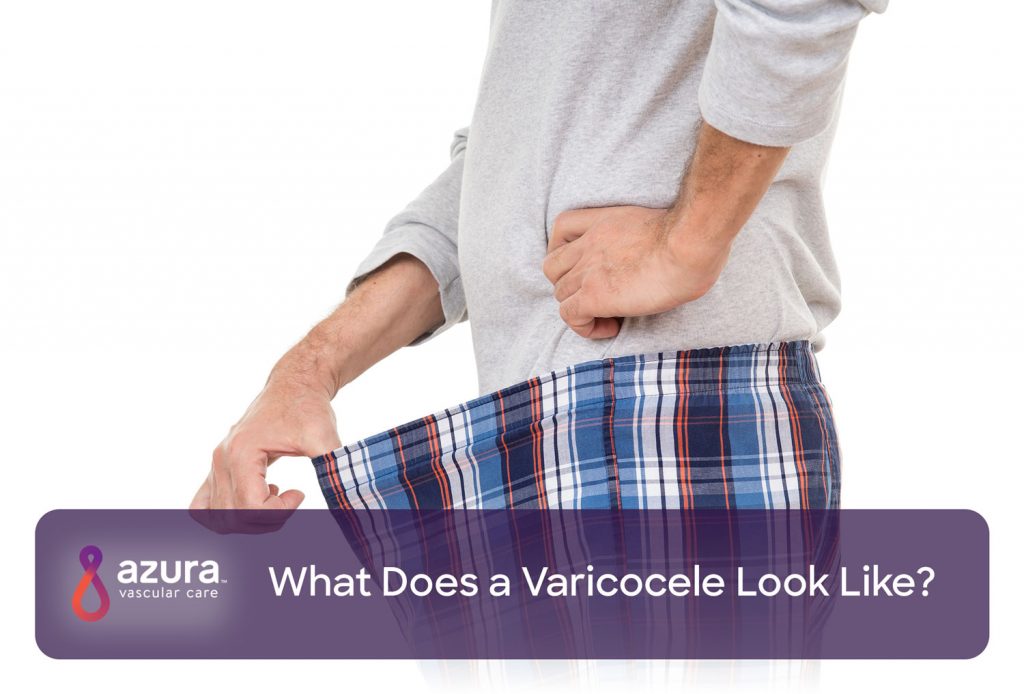
Varicoceles are most prevalent in men between the ages of 15 to 35 and can cause testicular pain, as well as shrinkage of the testicles. Testicular self-exams can help identify varicoceles. (i) A testicular lump may be a sign that you have a varicocele. (ii)
Now, you may be wondering, “What does a varicocele look like?” Read on to learn more about varicoceles, including symptoms and treatment options.
What Is a Varicocele?
A varicocele is a type of varicose vein. Varicose veins develop when the valves in your veins fail to keep blood flowing in the right direction. (ii) Malfunctioning valves can cause blood to pool in one area. The surrounding veins can then become enlarged, swollen, or twisted. While varicose veins may appear in many different parts of your body, varicoceles are varicose veins that develop in your scrotum.
Varicoceles can be uncomfortable and in some cases, they can affect your fertility. (iii) Many varicoceles are asymptomatic and smaller ones may be hard to notice. (iv) You may not know you have a varicocele until a doctor examines you. Oftentimes, a routine self-examination for lumps or changes in the feel and look may help identify varicoceles.
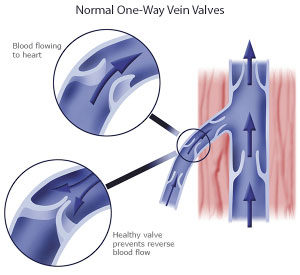
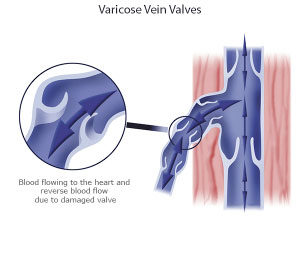
What Does a Varicocele Look Like?
Varicoceles frequently have a twisted appearance. If you have several varicoceles, your scrotum may look or feel like a bag of worms.
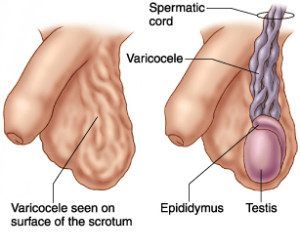 Some visibly noticeable symptoms of varicoceles are:
Some visibly noticeable symptoms of varicoceles are:
- One testicle that appears larger or heavier than the other
- Enlarged veins in your scrotum, commonly found on the left side of the scrotum
- A lump in your testicle
Other varicocele symptoms may include: (ii)
- A heavy aching sensation in your scrotum
- Pain that gets worse when you’re standing
- Pain that lessens when you’re lying down
- Pain that gets worse in hot weather
- Pain that gets worse after exercising
Any new or unexplained symptoms should be reported to your doctor. See a doctor right away if your pain suddenly becomes much worse, as this can be a sign of a serious health problem. (v)
What Are Possible Complications of Varicoceles?
While varicoceles don’t always cause health problems, recent studies have suggested that varicoceles may affect testosterone production. (vi) Low testosterone levels can lead to serious health and lifestyle concerns. (vii) Symptoms of low testosterone may include fatigue, weight gain, low sex drive, depression, trouble sleeping, difficulty concentrating and erectile dysfunction.
In some cases, varicoceles may also cause male infertility. (iii) Swollen veins and backed-up blood can change the temperature, blood flow, and pressure inside the testicles. These factors can affect your sperm count and sperm motility.
Fortunately, if a varicocele is the cause of your low testosterone level and fertility issues, treatment can help improve the production of testosterone, as well as restore your fertility and improve your chances of conceiving.
What Varicocele Treatment Options Are Available?
A varicocele diagnosis can be alarming, but a variety of medical procedures can help remove varicoceles. Some treatments involve surgery, but varicoceles can often be treated with a minimally-invasive procedure known as varicocele embolization. (viii)
What Is Varicocele Embolization?
During this procedure, a vascular specialist makes a small incision in your groin and threads a very thin catheter through your femoral vein. The catheter is directed to the varicocele, and the specialist inserts a small coil or a special fluid into the affected vein. The coil or fluid works to block blood flow. Since blood is no longer flowing through the vein, the varicocele shrinks and gradually disappears. (viii)
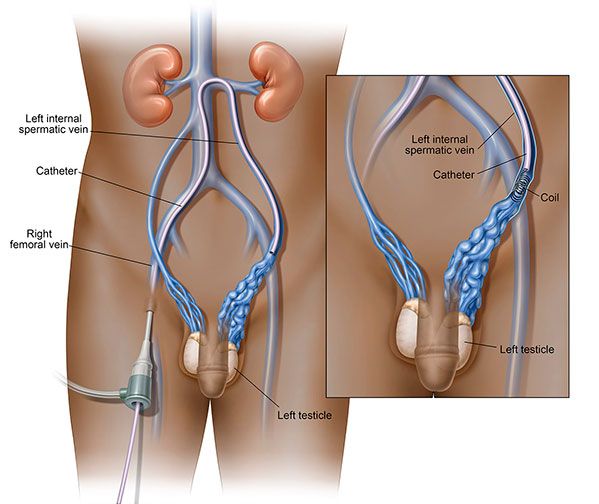
What Are the Advantages of Varicocele Embolization?
Varicocele embolization procedures are far less invasive than many other treatments for varicose veins. This procedure can usually be performed in an outpatient setting, such as a vascular center. Because your doctor uses a local anesthetic rather than general anesthesia, you can go home shortly after your procedure.
Recovery time is also much shorter, compared to more invasive surgical treatments. Many patients can return to their normal activities within a few days. And since the procedure involves a small incision, there is less risk of infection and a minimal chance of scarring.
Once you know what a varicocele looks like, you’re better prepared to make decisions that will protect your health and fertility. If you notice any of the symptoms of a varicocele, like a scrotum that looks or feels like a bag of worms, notify your doctor. And if you’re struggling with symptoms like low testosterone or infertility, don’t wait: contact a vascular specialist to discuss your treatment options.
To learn more about what you can expect from a varicocele embolization procedure, download our free information sheet below or call 844-705-VEIN (8346) to schedule an appointment with a vascular specialist.
Sources:
(i) Mayo Clinic. (2018, January 5). Testicular exam. Retrieved August 1, 2018, from https://www.mayoclinic.org/tests-procedures/testicular-exam/about/pac-20385252
(ii) Mayo Clinic. (2017, December 27). Varicocele. Retrieved July 26, 2018, from https://www.mayoclinic.org/diseases-conditions/varicocele/symptoms-causes/syc-20378771
(iii) Kantartzi, P. D., Goulis, C. D., Goulis, G. D., & Papadimas, I. (2007). Male infertility and varicocele: Myths and reality. Retrieved August 1, 2018, from https://www.ncbi.nlm.nih.gov/pmc/articles/PMC2658802
(iv) Stanford Health Care. Symptoms of varicocele. Retrieved August 1, 2018, from https://stanfordhealthcare.org/medical-conditions/mens-health/varicocele/symptoms.html
(v) Mayo Clinic. (2018, March 3). Testicle pain: When to see a doctor. Retrieved July 31, 2018, from https://www.mayoclinic.org/symptoms/testicle-pain/basics/when-to-see-doctor/sym-20050942
(vi) C. Tanrikut, M. Goldstein, J. S. Rosoff, R. K. Lee, C. J. Nelson, and J. P. Mulhall. (2011). Varicocele as a risk factor for androgen deficiency and effect of repair. Retrieved July 31, 2018, from https://www.ncbi.nlm.nih.gov/pubmed/21435152
(vii) WebMD. (2017, January 14). Low testosterone and your health. Retrieved August 1, 2018, from https://www.webmd.com/men/what-low-testosterone-can-mean-your-health
(viii) John Hopkins Medicine. Varicocele embolization. Retrieved August 1, 2018, from https://www.hopkinsmedicine.org/healthlibrary/test_procedures/urology/varicocele_embolization_135,383
